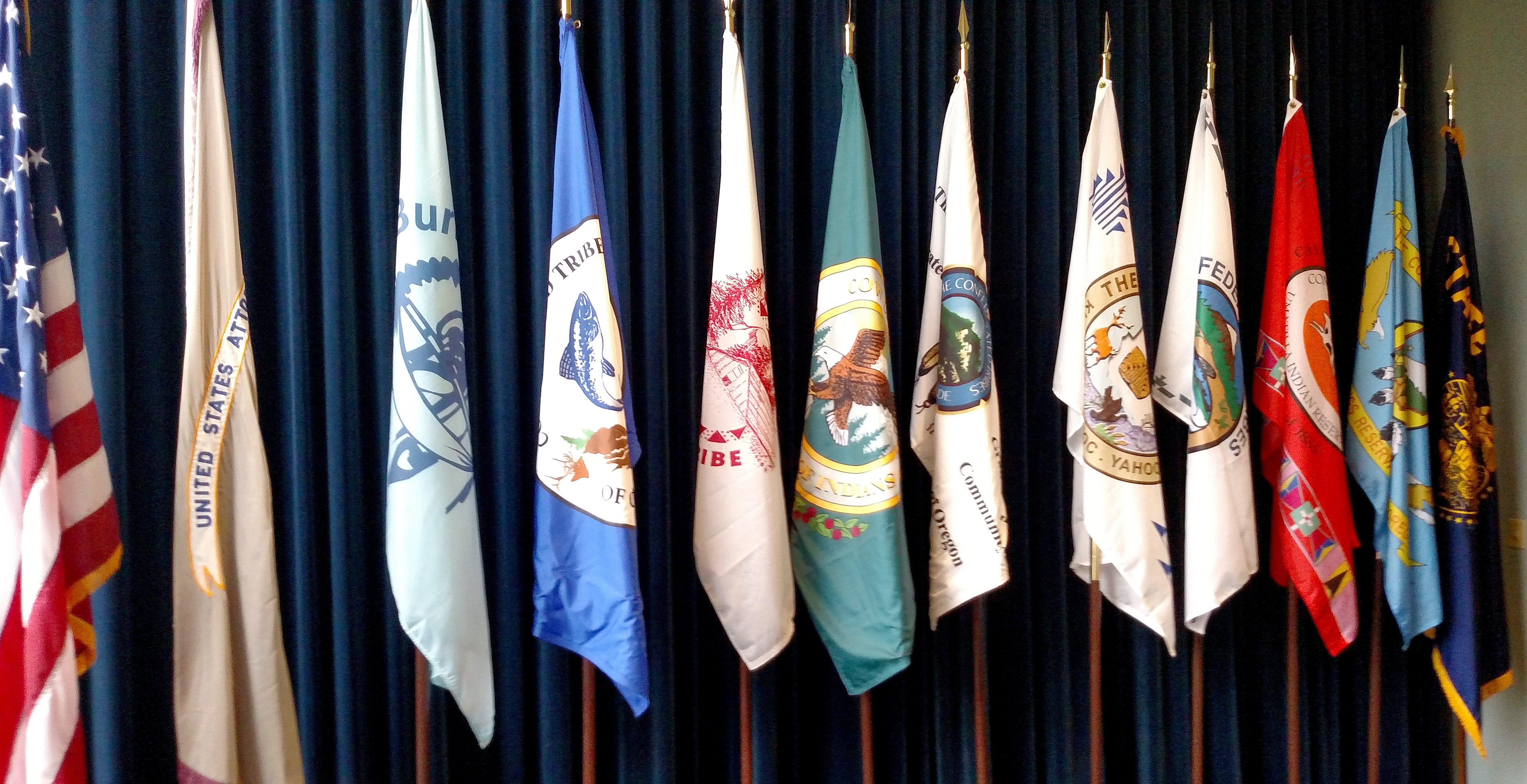Tribal Government & News
Tribal flag now standing in federal courthouse in Portland

PORTLAND – The Grand Ronde Tribal flag flutters in front of the Governance Center in Grand Ronde, naturally.
It also flies along with the flags of the eight other federally recognized Oregon Tribes in Salem at the State Capitol and in Eugene at the University of Oregon.
In addition, it also hangs inside Willamina School District buildings, where approximately a third of the students are Tribal members.
And now it is posted in a sixth-floor conference room of the federal courthouse in downtown Portland between the Cow Creek and Klamath flags.
Odd place?
Not according to Billy J. Williams, U.S. Attorney for Oregon, who said during a recognition ceremony on Wednesday, Oct. 5, that posting the nine flags of Oregon Tribes in a room where many large meetings are held will remind federal employees of the importance of government-to-government relations with Tribes.
“We’ve done this because we want a complete display of flags of importance in the District of Oregon,” Williams said. “So we approached each Tribal nation in requesting a flag to display in this room. … We believe that the display of Tribal flags along with the U.S. flag and that of the state of Oregon will recognize the importance of the Tribal sovereignty of Tribal nations in the state of Oregon. These flags will be a reminder to all employees of the department and any visitors – we hold a lot of meetings in this room – of our government-to-government relationships. It is genuinely a great honor to display these flags in this room.”
Williams, who has worked in U.S. Attorney’s Office for almost 16 years, said he started as the Tribal liaison for the Department of Justice. He said it took about two years to obtain all of the flags from Oregon’s Tribes.
“The U.S. Attorney’s Office has a long history of working with Tribal nations in the state of Oregon and we have a rich history of honoring the trust relationship that we have with each of the nine federally recognized Tribes,” Williams said. “We have strived to build those strong relationships through annual consultations and getting involved in issues of importance to individual Tribes in both the criminal and civil arena.
“I would note that as someone who has been involved in our government-to-government relationships for the past 16 years, every former U.S. Attorney that I have served under has made Indian Country a priority. … I think that we have been passionate about living up to our trust responsibilities here in the District of Oregon.
“Consultation between the United States and the Tribes is the cornerstone of our Tribal work. We can’t do our jobs without those consultations.”
Because of a budget summit and conflicting obligations, no Grand Ronde Tribal Council members attended, but Tribal member David Harrelson, the Tribe’s Historic Preservation officer, accepted the award for the Tribe.
Following the presentation of awards to Tribal leaders, Williams opened the floor for comments.
Harrelson stressed the importance of treaties, especially the Willamette Valley Treaty of 1855 that was signed by his ancestor, Joseph Shangretta.
“On behalf of Grand Ronde, I want to thank you for acknowledging and recognizing the first peoples of Oregon,” Harrelson said. “Something that is very important, and I know yourself and a lot of the people in this room understand, is what treaties are and what they mean, but it is something that a lot of the world doesn’t understand. A lot of the work that we do is try to convey that.”
Harrelson looked out the sixth-floor window at the high-rise buildings in Portland, which is part of the Grand Ronde ceded lands.
“Those treaties are forgotten about,” Harrelson said. “You will hear Tribal people talk about our treaties and talk about these things that have happened and these obligations that were made, and ultimately it is all a part of a narrative of ‘We don’t exist anymore. We’re extinct.’ … I have to explain to people all of the time that we are still here. The people of this place, we have survived. We survived removal, we survived the reservation era and forced assimilation, and in the end we even survived Termination.
“The other component is that treaties are not just Tribe’s treaties, they are the foundation for everything. They are the foundation for that while we survive, this place thrives. Look at this; we are standing in these tall skyscrapers in Portland: our former lands, former village sites, our former fishing grounds. Everything that has made this place great and wealthy was once ours. And there are still pieces of it that are still ours.
“We have to work through that process and share that these treaties are not only the foundation for Tribal people and our future and how we survive, but also for this place and how Oregon thrives.”
Harrelson complimented the U.S. Attorney’s Office for recognizing not only the Grand Ronde treaties, but also those of other Oregon Tribes.
“The U.S. Attorney’s Office has been an ally in recognizing what those foundational legal documents are to the state of Oregon and this land itself, as well as Tribes,” Harrelson said.
Also in attendance was Senior Staff Attorney Deneen Aubertin Keller.
Other high-profile Oregon Tribal leaders included Dee Pigsley from Siletz and Michael Rondeau from the Cow Creek Band of Umpqua Indians. Almost every Oregon Tribe, including the eastern Tribes, sent representatives to the event.
